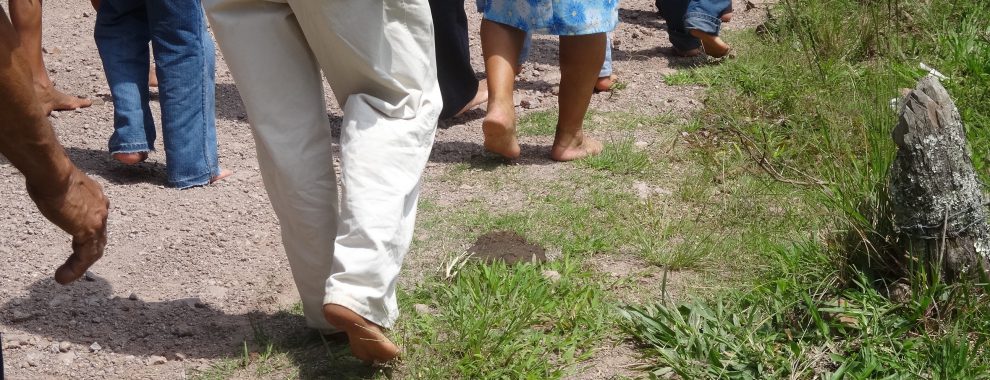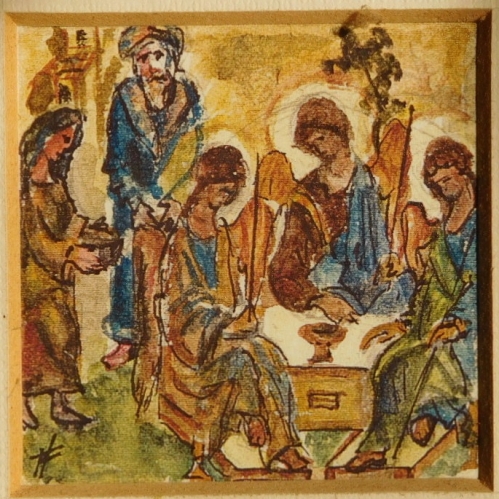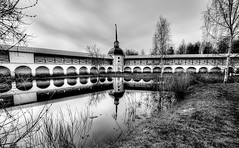Rambling notes for a homily for the thirteenth Sunday of Ordinary Time, Cycle A, July 2, 2017.
Romans 6: 3-4, 8-11; Matthew 10, 37-42
I love swimming; I used to swim laps in a pool for 10 to 30 minutes. That’s one thing I miss here in Honduras. I also like to swim in the ocean, diving into oncoming waves, body-surfing back to shore.
But one day a few years ago, I was on an excursion in Tela, Honduras, and the boat left us on one side of a tunnel that we could swim through. Halfway through I was belted so hard by the waves that I wondered whether I wound drown.
The Christian life is not like swimming laps in a pool. Sometimes it’s going into the dangerous and turbulent waters – the water of Baptism – where we experienced the danger of life in Christ, drowning in the baptismal waters to die with Christ
In the early church the catechumens were baptized by submerging them three times under water, dying with Christ, to live with him. As St. Paul says
…we who were baptized into Christ Jesus were baptized into his death? We were indeed buried with him through baptism into death, so that, just as Christ was raised from the dead by the glory of the Father, we too might live in newness of life.

Going down into the waters of baptism, they perhaps felt as if they were going to die and, in one sense, they did die to the idols of their time – power, violence, money, empire. But, leaving the waters of baptism they began to live in the risen life, with a new way of seeing the world and a new style of life – with love, without fear, in solidarity with all, especially the poorest, no longer alone. They lived in Christ, not under the power of the empire and the current customs.
Thinking in this way, we can understand better what Jesus says in the Gospel.
In the church we place great value in the family, even celebrating the year of the family. But Jesus appears to say something against this:
Whoever love mother or father more than me is not worthy of me; whoever love son or daughter more than me is not worthy of me.
Father José Antonio Pagola wisely notes:
…it’s not enough to defend the value of the family in itself, because the family can form itself in many different ways in real life.
There are families open to service of society and families turned in on their selfish interests. There are families which educate in egoism and families which teach solidarity. There are liberating and oppressive families.
…for Jesus, the family is not something absolute and untouchable. It is not an idol. There is something above and before the family: the Reign of God and His justice.
What is decisive is not family in the flesh, but the great family which we have to construct among all the sons and daughters working together with Jesus in opening paths toward the Reign of the Father.
If we don’t live in families as persons renewed by our baptism, we live in accord with an idol – seeking our security there, grabbing on to money and power in order to have a “good” family life which is not open to other, which is enclosed on itself.
Jesus also tells us that we have to carry the cross, we have to give our lives and not live tied to our plans and our ideals. We have to be open to a God beyond us.
But in the words of a Salvador song in honor of Monseñor Romero
Many of us seek a god of the pocketbook,
A god who fits in with our idols,
A god who is content with what we pay our workers,
A god who approves our abusive crimes…
But we have a God who is a demanding God, but our God demands love and mercy and justice. And demanding this, he was crucified.
But we sometimes want a faith without the cross. Or, as Richard Niebuhr wrote, we seek a religion without aa sting, and we preach ““A God without wrath [who] brought men without sin into a Kingdom without judgment through the ministrations of a Christ without a Cross.”
But the Cross is central – not as a sign of death, but as a promise that by dying, by giving himself away, God raises us up.
The Cross is not an ornament – it was an instrument of torture meant for those who were considered threats to power. But in Jesus, the Cross is the symbol – and the reality – of a God who conquers the power of domination, money, oppression, death, a God of love.
When we let this Christ live in us, we can be the family of God, full of love, charity, solidarity, and handing ourselves over, ready to risk ourselves for the Reign of God. We can be followers of Christ to the point of giving ourselves over to God and others, to the point of giving our lives every day to serve god and the poor.
There we find live, submerged in deep waters, in abundance.
The photo is of a baptism at St. Thomas Aquinas Church in Ames, Iowa, during an Easter Vigil








